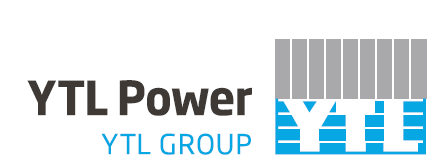200 people in village near Tapah, Sarawak benefit from improved access to water and clean drinking water.
Rita, 50, walks home after a long day spent at the market 3km away selling her small harvest of midin (local fern), long beans, and kangkong (water convolvulus). She carries a woven basket on her back filled with a heavy but precious load, water.
The last 1.5km stretch back to her home takes her off the tarred town road onto a gravel path overrun with potholes. She walks slowly, careful not to step on sharp rocks and hurt herself, as she adjusts the basket’s straps to ease the weight on her shoulders. Dusty from the walk, it takes her almost an hour to finally reach home.
She unloads the two 5L bottles from her basket and sets to work portioning the water for drinking and cooking. It has to last until tomorrow, which is when she will set out to the market again to sell her produce, buy drinking water, and walk back home. This is her daily life.

For Rita and the 200 people living in Kampung Sion near Tapah town at Siburan, water poverty has been a fact of life for the past 30 years. The community here mainly rely on rainwater and a river 300m away for their daily use. In recent years, however, the land upstream was developed for agricultural and industrial use, polluting the river that they bathe in. Rashes that fester into open sores and scabs began to appear on their skin.
Realising this, the people of Sion turned to rainwater as their primary water source. Lacking the means to invest in a proper rainwater harvesting system, they relied on their own ingenuity to create a crude design by tacking together pieces of zinc, shaping lengths of wire, and using anything they had on hand. Not everyone could afford a tank so buckets, jars, and whatever that could be used to hold water sufficed as storage.
Still, water—especially drinking water—is scarce and they have to resort to buying water from town. With an average household income of RM800 per month (the lowest-earning family only brings in RM300 a month), every cent spent counts.
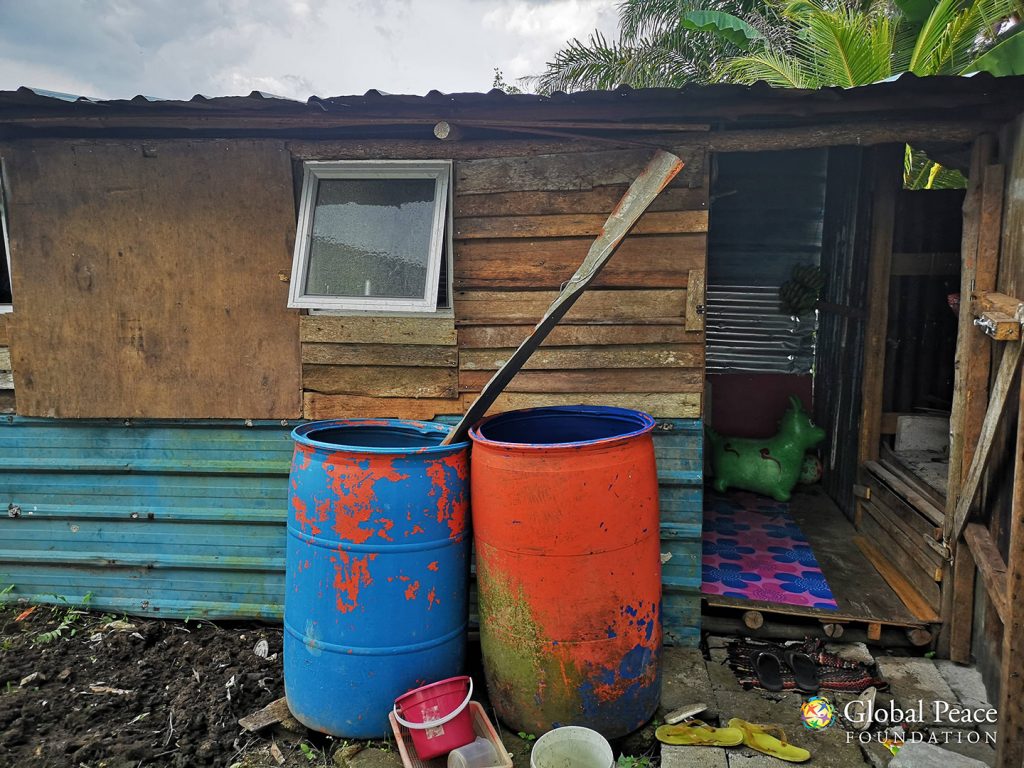
Communities Unite for Purewater (CUP): A Clean Water Initiative
CUP is a Global Peace initiative that aims to uplift the welfare of rural and underserved communities through the provision of clean water. To date, CUP has benefited over 4,256 people in 21 communities across Malaysia through technical solutions that improve access to water, filtration technology that provides clean drinking water, and Water, Sanitation, and Hygiene (WASH) training that increases knowledge and awareness on water management and hygiene.
Global Peace’s CUP project is one of the first eight projects selected for the Social Outcome Fund (SOF), a funding model by Agensi Inovasi Malaysia (AIM) that seeks to drive funding for social intervention programmes by social-purpose organisations (SPOs) to address social issues. This CUP project in Sarawak is funded by YTL Power and has provided 400 people in two communities—Kampung Sion, Tapah and Kampung Semada Belatok, Serian—with access to clean water. The project started in February 2018 and will be completed by February 2019.
A Collaborative Solution for Water Woes in Sion
In order to come up with a solution to the water poverty issues in Sion, the Global Peace team conducted community engagement sessions every month to understand the community’s needs.
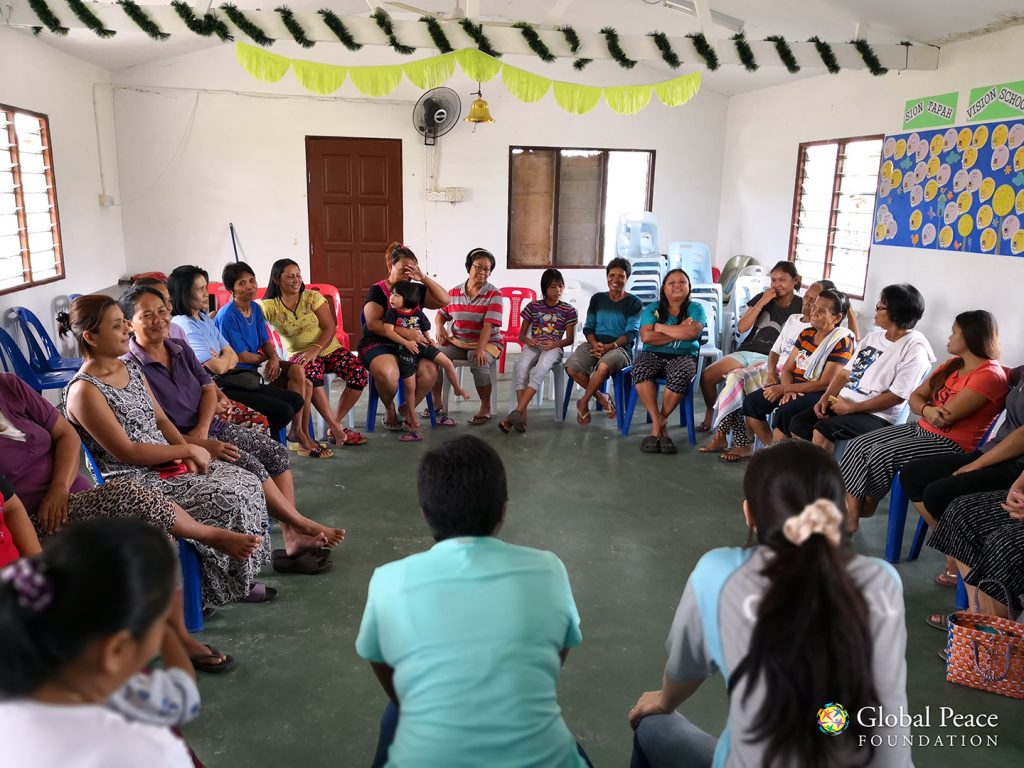
“It’s important for the solution to be tailored to each community as their problems, needs, and circumstances are unique. There is no one-size-fits-all solution,” says Global Peace CEO, Dr. Teh Su Thye. “We gather everyone’s feedback on how to solve the problem, fine-tune it, create an action plan, and make sure that everyone in the community commits to it. This ensures the success and sustainability of the solution.”
After several months of discussions and meetings, a solution was decided upon. It was agreed that the community needed an efficient rainwater harvesting system and high-capacity storage tank to provide a steady supply of water. This would reduce the health risk of using water from the river and ponds that are contaminated. Each house would also receive a Lifestraw Family 2.0 water filtration system that can be used to filter rainwater into clean, drinking water. The villagers would be able to save money from buying water every day and lower the health risk of drinking untreated water.
Water, Sanitation, and Hygiene (WASH) training, which is the core educational component of the CUP programme was also carried out. The training is split into modules that address the main areas of health concerns in Kampung Sion, like safe water management, importance of handwashing, and proper nutrition and diet. These small behavioural shifts help prevent diseases and are crucial for improved health in the long-term.
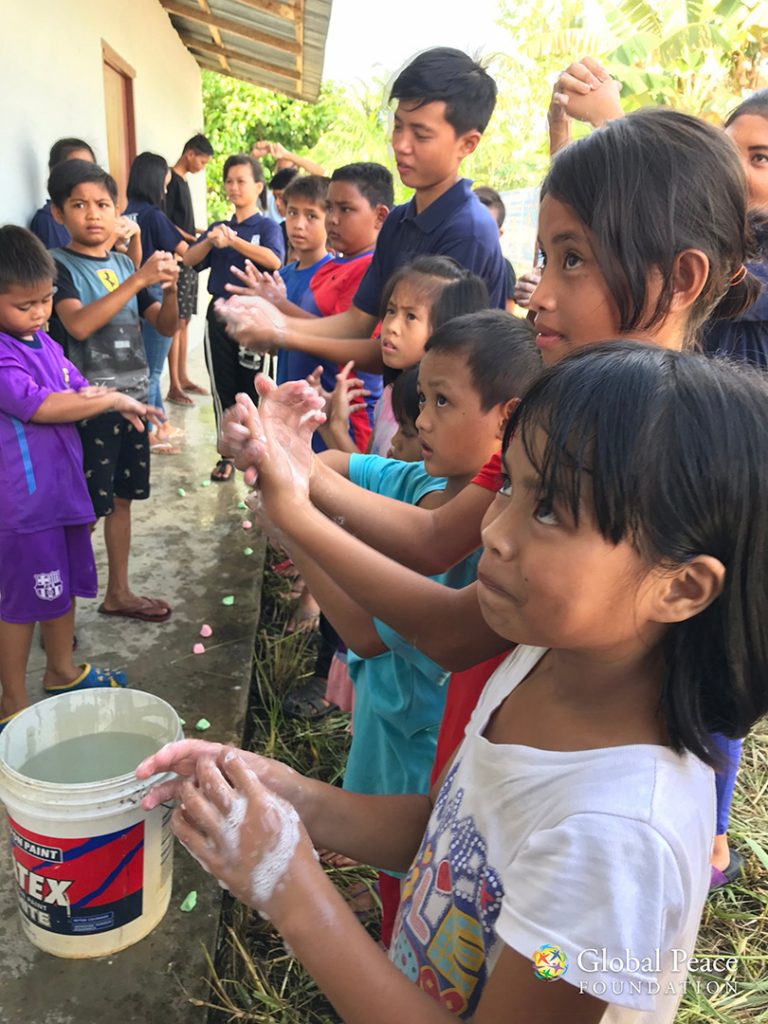
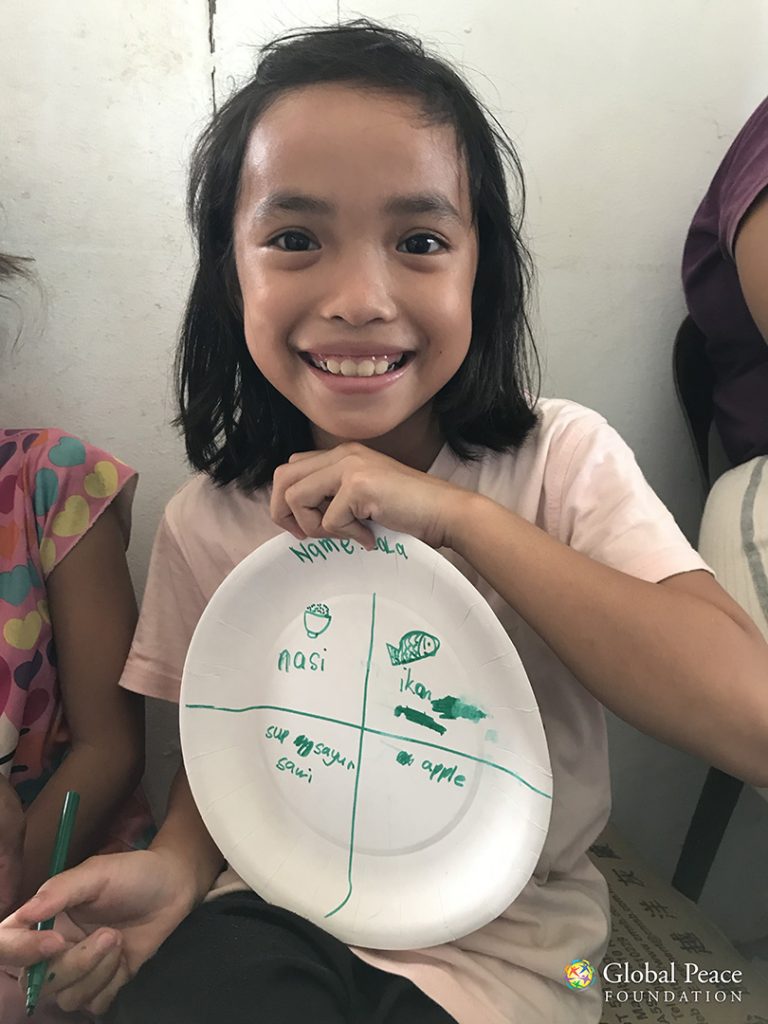
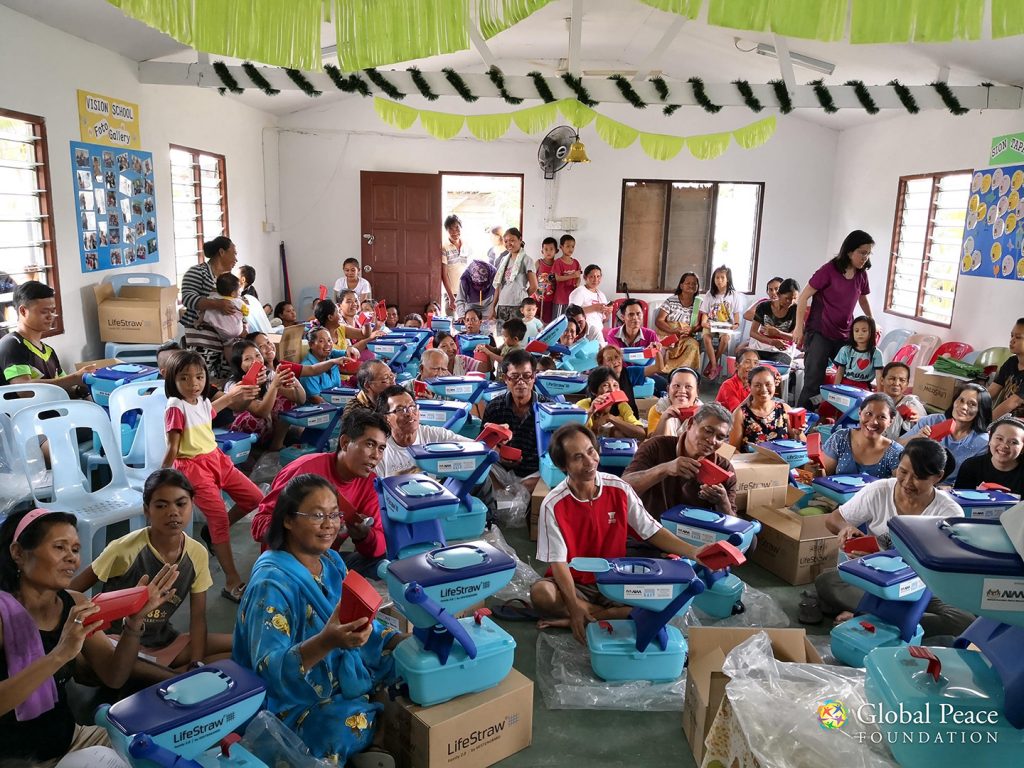
A total of 45 Lifestraw Family 2.0 water filters and one Lifestraw Community high-volume water filter were distributed. The Swiss-designed LifeStraw filters are approved by the World Health Organisation (WHO) and remove up to 99.9999% of bacteria, protozoan parasites, and viruses, and filter out particles larger than 0.02 microns. It is portable, easy to use and maintain, and the filtered water is safe to drink even without boiling.
Global Peace reached out to Associate Professor Ir. Dr. Sim Kwan Yong, the Head of School of Engineering from Swinburne University of Technology Sarawak for help in designing a more efficient rainwater harvesting system for each household. A team of lecturers consisting of Ir. Dr. Kuok King Kuok, Ng Lieu Thai, and Dr. Muhammad Rafiq Mirza Julaihi drafted a plan after a site survey to Kampung Sion.
According to Ir. Dr. Kuok, who is the Discipline Leader of Civil Engineering at Swinburne Sarawak, “Based on the site survey and discussions with villagers and Global Peace, we proposed a simple and efficient rainwater harvesting design that can cater to the needs of each individual household. Each house was given a water tank and assisted with proper gutters and piping set up to harvest rainwater efficiently. Together with the Lifestraw Family 2.0 water filters provided by Global Peace, each family now have access to not only clean drinking water, but also clean water for daily use at their own home.”
“Engineering is about improving life. It is a great privilege to work with Global Peace to create positive social impact for the community at Kampung Sion,” says Associate Professor Ir. Dr. Sim Kwan Yong, the Head of School of Engineering at Swinburne Sarawak.
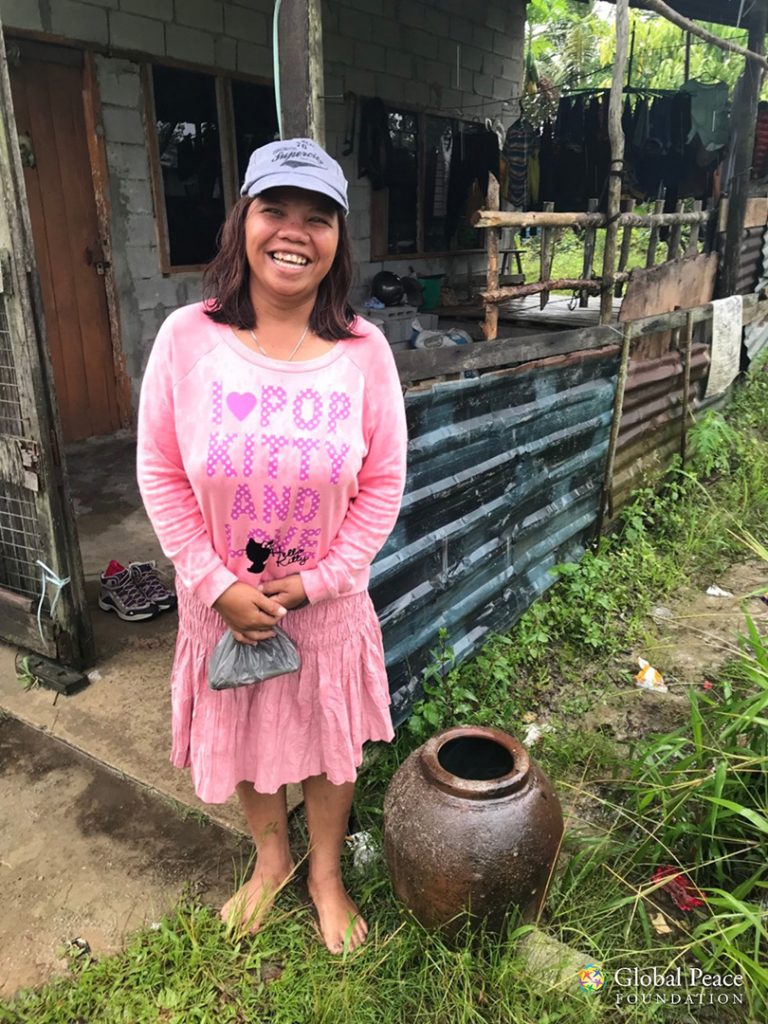
rainwater.
Aida (30) lives with her husband Ricky, and father-in-law (65), and two sons aged seven and nine. Both she and her husband are construction workers and they travel as far as Kuching—1.5 hours away—to work. At night, Aida works at a local coffee shop as a server and takes on odd jobs whenever she can.
Her family is one of the lower income families in the village. When we first visited her, she only had a small earthenware pot and two buckets to store rainwater. When Aida and Ricky are away at work, her aging father-in-law has to walk to town to buy water, a journey that takes twice as long for him because of his joint pain and shortness of breath.
“I am truly thankful that I don’t have to worry about water anymore. My father-in-law can rest at home as he should. He can get water from our new tank easily,” says Aida. “Now, I can concentrate on working and saving money for my children. I want them to finish school, go on to university, and get good jobs. I want them to have a better life.”

Moving Forward: Future Lies in Youth
While the technical implementation of CUP is completed in Kampung Sion, the project is still in the monitoring phase and the Global Peace team will continue to visit the community to troubleshoot any problems that may arise and gather feedback from the people. Kampung Semada Belatok is also in the final monitoring stage; the community received 17 sand filters to filter the pond water that they rely on for bathing and washing, and 25 Lifestraw Family 2.0 water filters for each household.
The team will also continue with WASH training and community engagement activities in the coming months.
“After working with Sion for almost a year, we’ve grown so close to the people here. They have such big hearts and the children especially, they love taking part in the activities,” explains Global Peace Programme Coordinator, Fiona Foo. “These children carry the hopes of their family and it’s important that we give them every opportunity to learn, grow, and soar. We’d love to start a youth programme here in the future.”
This Communities Unite for Purewater (CUP) project is made possible by our sponsor, YTL Power, for Social Outcome Fund in partnership with Agensi Inovasi Malaysia (AIM).
Written by
Yong Joy Anne, Storyteller
